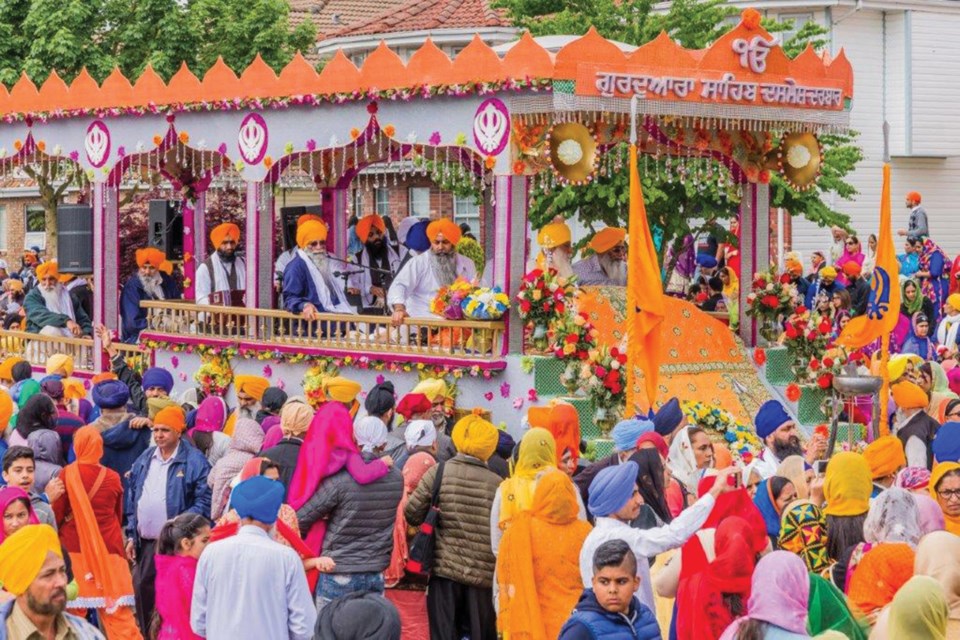The vibrant festival of Vaisakhi/Baisakhi is considered to be an extremely important festival for the Indian diaspora across the world and especially in Canada for a number of reasons.
Vaisakhi is a spring harvest festival marking the Solar New Year for Sikhs and Hindus. Apart from being important to the farmers as a harvest festival, the festival has a special religious significance to Sikhs as they celebrate this day as the foundation day of Sikh Faith known as The Khalsa Panth.
Harvest festivals like Vaisakhi are generally celebrated all around the world.
Thanksgiving, a national holiday in Canada and United States, is a prime example about celebrating the harvest and other blessings of the past year. For centuries, the farmers in Europe held celebrations at harvest time to give thanks for their good fortune and the abundance of food. The early colonists and settlers brought this tradition with them when they arrived in North America, giving thanks for safe passage and bountiful harvests. They began the tradition of eating turkeys, ham or lamb, pumpkin pies, and the gathering of family and friends.
Vaisakhi Festival is celebrated as a Thanksgiving Day festival generally on April 13 or 14 in many parts of Northern India including Punjab where most of the Punjabis in Canada are originally from. On this joyful day, the farmers offer their prayers in thanks for a bountiful harvest of the winter (Rabi) crops.
Significance of Vaisakhi in Sikhism
The vast majority of the local Indo-Canadian population settled in Canada, especially in Greater Vancouver and Toronto, are from the Sikh faith.
The Sikh community in Vancouver is the one of the oldest, largest and influential across Canada who started arriving and settling in the late 19th century. For Canadian Sikhs, Vaisakhi is a special time to celebrate and share their faith and their heritage with their friends and neighbours. It's a time to celebrate a century of Sikh history here in Canada and the accomplishments of Sikh Canadians in every facet of society.
Most Canadians are probably familiar with the sight of colourful Vaisakhi parades to mark Vaisakhi, but perhaps unaware of the significance and history behind the holiday.
On Vaisakhi Day in 1699, Guru Gobind Singh created the order of the Khalsa Faith by baptizing the first five members of the Khalsa, calling them Punj Pyaares, (the Five Beloved) giving them distinct identities and a code of conduct to lead selfless lives serving humanity. Since then, this historical event continues to be celebrated with much gaiety, vigour and enthusiasm.
The highlight of these celebrations are the parades or processions.
The parades are led by “Punj Pyaare” or the five beloved who represent the first five Sikhs to have become members of the Khalsa. They are followed by a decorated float carrying the Sikh scripture Sri Guru Granth Sahib. Sikhs follow in procession behind the float singing hymns, displaying the Sikh martial arts and distributing free food to Sikhs and non-Sikhs alike.
Although Vaisakhi parades know as Nagar Kirtans have been held in Canada since the early 1900s, in recent years in many cities, they have become massive events drawing tens of thousands of participants. Everyone is welcome to attend Vaisakhi Day parades and the celebrations attract Canadians from every religious and cultural background. Orange is a colour traditionally associated with Vaisakhi and is worn by many of the participants who take part in celebrations.
Since the last 25 years, Vancouver and Surrey Gurdwaras have been organizing Vaisakhi processions in the Lower mainland.
Today, the Surrey Procession/parade is the biggest Vaisakhi Parade outside India with thousands of participants from all over North America. Each year, over half a million people line the 1.5-mile parade route to watch the procession, which takes more than five hours. There are numerous other cities across Canada celebrating the Vaisakhi Day with parades involving 10,000 to 20,000 participants each.
In 2020, all the Vaisakhi Day parades had to be cancelled as a result of the COVID-19 pandemic; it was again cancelled in 2021. This year, even though COVID restrictions have been lifted or eased, as a precautionary move in public health interest, there will be restrained and smaller Vaisakhi celebrations confined to the Surrey and Vancouver Gurudwara premises.
The annual Vaisakhi Day parades have become a show of strength for Indo-Canadians, as well as a must-attend event for a slew of political candidates. A proud moment for the many Punjabis whose ancestors had to fight stereotypes and racial prejudice to find acceptance in the New World.
Today, people of all backgrounds celebrate Vaisakhi, especially throughout Canada, United States, UK, Australia and India. In present times, cities and local governments are keen to use the public interest in the Vaisakhi Day celebrations to drive tourism and showcase multiculturalism and Punjabi culture to the rest of the world.
-Article courtesy Raj Bhandall of WWW.WANJARANOMAD.COM



